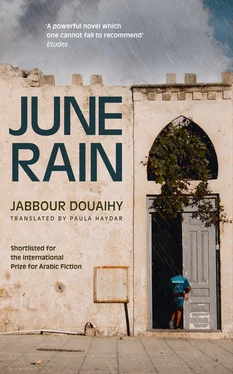The man stood in the doorway. Rarely did another man besides Samih come to the bakery. Samih didn’t look up. Maybe he thought the man was calling for his wife or some female relative for some urgent matter.
The man didn’t speak and didn’t come inside. He stood in the doorway, blocking the light from outside.
The news of the boy’s murder out on his balcony as he studied his lessons hadn’t spread yet, which is why the women didn’t pay much attention to the fact of the man standing in the doorway.
They kept on rolling and stretching the dough and dusting it with flour, but they stopped talking as a cautionary measure.
The man’s right hand was behind his back. He lowered it and the revolver appeared. It was cocked and ready as it shone in the bright sunlight.
He raised his arm to aim, mumbled some incomprehensible words, and shot three bullets. All three hit Samih, who was not paying attention to what was going on in the bakery doorway. He probably didn’t want to know what was going on.
He was waiting for the right moment to remove the loaf of bread from the oven, waiting for the onset of the burning smell and to see the little black spots appear.
The man said something out loud that the women didn’t hear. The sound of the three bullets exploding into the little bakery deafened their ears.
The man tucked his gun back inside his belt and left — he and his relatives, too. Daylight streamed back into the bakery.
Samih didn’t fall to the ground.
He fell into the chair he always kept beside him.
He sat down with a slight look of rebuke in his eyes, looking at the women, one by one.
‘Pardon me for receiving you dressed this way. I’ve lived alone many, many years and rarely leave the house. The woman who cleans for me hasn’t come this week. I don’t know where she disappeared to or what I’ll do without her… Come closer, come closer, don’t be shy. I’ll tell you what you what to know. I don’t know who led you to me, but I remember you from a long time ago when you were just a small child running about the quarter and Kamileh would yell to you: “Eliyya!”
‘And you wouldn’t turn to look. I can still hear the sound of her calling to you. “Eliyyaaaaaaa…”
‘I’ll sit here, right here in my spot on the red sofa. I like the feel of the velvet even though it makes you feel even hotter in the summer.
‘Where did you get that picture? I know Davidian. He used to have a studio in the square. And I also know another photographer not many people know named Jorge al-Indari who especially liked to take pictures of women. He took the nicest portrait of me. I still have it. But he died in vague circumstances. Yes, that’s your father. That’s Yusef al-Kfoury. He had a sweet face. I remember how he’d always say to me whenever he saw me, “How are you, son of Al-Aasi?” He was the only one who called me “son of Al-Aasi”.
‘Look. Through that window. Come closer to me. Closer. What do you see there? The grapevine and the rusty roof tiles, right? That’s your house. Maybe you’re not used to seeing it from here. And those are your mother Kamileh’s flowers and her grapevines. People think our house is far from Yusef al-Kfoury’s house, but they’re wrong. Look — it’s less than a stone’s throw away. You are our closest neighbours. But nowadays if we had to go and see you for some reason, we’d have to go all the way down the main road and up around the church. A long way, and frankly I don’t like walking that way. All day long and into the middle of the night during the warm summer nights there are kids everywhere, and they’re rude kids, no respect for anyone. Their mothers are even worse than they are, sitting on low chairs in front of the houses and the shops with their legs and jaws wide open, waiting for anyone to pass so they can say something negative about them. They mock me saying I walk on my tiptoes, but I don’t pay any attention. That’s the way I walk and I’m not going to change it just to please them.
‘In the old days, to go up there we used to cut through the garden between us on foot — along a dirt road at the edge of the garden. It didn’t bother anyone and saved us a lot of time. And actually sometimes on the way up or the way down the path some of us would pick a tangerine or a loquat because we knew that at the end of the season everything would die on the branches in that vacant garden. Then one of those bratty kids told the property owners on us. They were old-time émigrés to Mexico. He wrote them a letter making it sound as if their land here had become a free for all. So these people, who were very rich — people called them the cotton kings — sent after one of their relatives asking him to put up a fence around the garden to stop us from using it as a shortcut.
‘Your mother knows the story. Ask her. At any rate, if anyone made a sound out on your balcony, we could hear it over here perfectly clearly. I used to hear you playing your accordion. You liked French tunes a lot, I remember. If someone as much as coughed on the balcony, we’d hear it. On quiet nights we could hear conversations from there, even if it was just Kamileh talking about everyday matters with Muntaha, her friend ever since the day she moved into the quarter. Sound travels at night. Your balcony was a popular destination for the neighbours. I was happy in the past when I saw them return to your house to congratulate your mother on your arrival. Kamileh wasn’t always such a recluse. Circumstances changed over time, though, and in recent years she’s stayed by herself the majority of the time. She prunes her flowers, waters them, talks to them. Your mother gets mad at the flowers if they droop or start to wilt. She chides them and sometimes she sings to them. We can hear her voice from here singing her mawwaals . We look forward to hearing her sad voice nearly every night.
‘I used to be amazed by her beautiful voice, which was powerful despite her age. But then we found out one day, not too long ago, that she had recorded her voice on a tape. Did you know that? She recorded her voice so she could play it back. All along we’d been listening those nights to the tape recorder. Kamileh acquired a tape recorder before we did, but we bought the radio before you and nearly everyone else in the neighbourhood. You hadn’t been born yet when I started sitting here. My mother used to bring me a cup of coffee every morning to this little table because she knew I’d come here as soon as I got up, to this place where I spent most of my time listening to the radio and smoking cigarettes.
‘I was infatuated with that radio, especially loved listening to Layla Murad and Mohammed Abd al-Wahhab songs. And when radio plays became popular I used to follow them daily, but I didn’t dare raise the volume too high. For years after the Burj al-Hawa incident I didn’t dare raise the volume on the radio. I used to keep the radio right there, in the salon. I think we bought it early on because of my cousin Odette who had joined the radio station chorus in Beirut. They had chosen her to sing a solo. So my mother saved up the money and bought the radio. When it came time for Odette’s song to be broadcast all the neighbours gathered at our house. Her mother and my mother ululated with delight and Odette was sitting there with us, too.
‘That was before all the fighting started, after which they all donned black mourning clothes and even stopped pounding meat for kibbeh in the mortar. That’s when I started being cautious about the volume and only turned it up loud enough to hear the songs when I went into the kitchen. Whenever we heard a knock at the door, we’d quickly turn off the radio before opening the door. We did that for years, even after the fighting was over and people went back to mixing with each other again. We would turn the radio off — that was my job, and my mother would put the dog in the closet in the bedroom so visitors wouldn’t hear him even if he started barking in there. Yes, we used to turn the radio off and close its cloth cover to make it look like we hadn’t touched it in a long time, and we’d hide my white dog. The dog used to sit beside me the whole time I sat here. He’d close his eyes and he’d let out a low bark at any sudden movement nearby. I named him Freddy, but I didn’t dare take him out into the streets. I was afraid the kids would follow me and whistle at me. Those wild bastards.
Читать дальше












